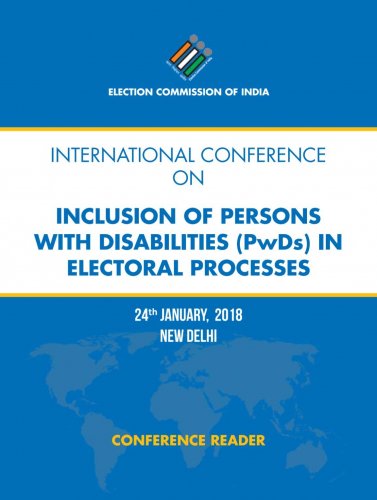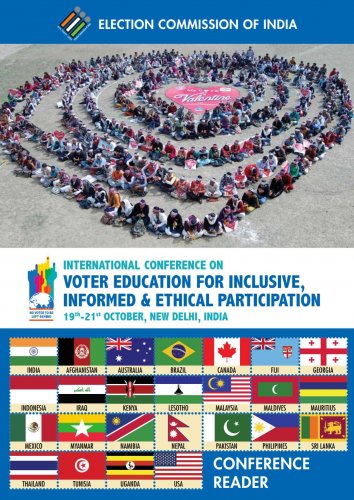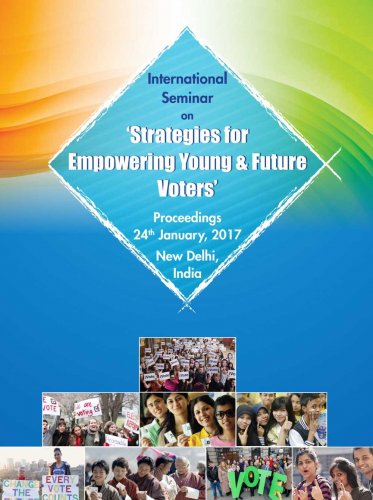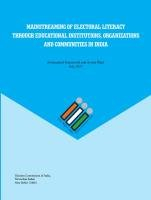20 files
-
A-WEB India Journal of Elections Volume III Issue No 1 (July-December 2023)
By ECI-IT
A-WEB India Journal of Elections Volume III Issue No 1 (July-December 2023)
Published in 2023 by the India A-WEB Centre
Election Commission of India, Nirvachan Sadan
Ashoka Road, New Delhi 110001
www.eci.gov.in
https://indiaawebcentre.org/
Copyright © ECI All rights reserved with the Election Commission of India.
The content of this document cannot be used without the valid approval from the publisher. (Title of the Journal has been verified by the RNI, Govt. Of India vide their letter No. 1357020, dated 21.8.2020 with Title Code DELENG19783)
78 downloads
Submitted 07/23/2024
-
A-WEB India Journal of Elections- Call For Papers (For Volume III Issue 2)
By ECI
Call For Papers: Volume III Issue 2 slated to be released in September 2024.
Last date of submission of Contributions: 31 August 2024
Preferred date for receipt of Abstracts: 15 July 2024
Contribution in the form of Research Papers, Articles and Book Reviews etc is invited from the Members of Election Management Bodies and Partner Organizations of the A-WEB; Institutions of Excellence, Practitioners, Eminent Writers, Academia and Researchers for publication in the next Issue of the AWI-JOE slated to be released in September 2024 .
Last date for submission of Papers for the said Issue (Volume III Issue 2) of the Journal is 31 August 2024. Receipt of abstracts or the title of the contribution by 15 July 2024 would be appreciated .
Manuscripts may be submitted as per the timelines to International Cooperation Division, of the Election Commission of India eci[dot]intl[dot]coop[at]gmail[dot]com
Contributors are requested to carefully go through the detailed guidelines mentioned in the CFP and the Author Guide while preparing the manuscripts.
For any queries please contact:
Pramod Kumar Sharma, Principal Secretary, International Cooperation Division, Election Commission of India, New Delhi 110001 V. K. Sharma, Consultant, International Cooperation Division, Election Commission of India, New Delhi 110001
eci[dot]intl[dot]coop[at]gmail[dot]com1,243 downloads
Submitted 08/08/2024
-
A-WEB India Journal of Elections Volume II Issue No 1 (April-September 2022)
By ECI
A-WEB India Journal of Elections Volume II Issue No 1
(April-September 2022)
Published in 2022 by the India A-WEB Centre
Election Commission of India, Nirvachan Sadan
Ashoka Road, New Delhi 110001
www.eci.gov.in
http://indiaawebcentre.org/
Copyright © ECI All rights reserved with the Election Commission of India.
The content of this document cannot be used without the valid approval from the publisher. (Title of the Journal has been verified by the RNI, Govt. Of India vide their letter No. 1357020, dated 21.8.2020 with Title Code DELENG19783 )
282 downloads
Submitted 05/17/2023
-
A-WEB India Journal of Elections Volume I Issue No 1 (October 2021-March 2022)
By ECI
A-WEB India Journal of Elections Volume I Issue No 1
Volume I Issue No 1 October 2021-March 2022
www.eci.gov.in
http://indiaawebcentre.org/
Copyright © ECI
All rights reserved with the Election Commission of India.
The content of this document cannot be used without the valid approval from the publisher or the original publisher Registered with the Registrar of Newspapers of India under Regd. No. DELENG/2021/80689
360 downloads
Submitted 12/20/2021
-
A-WEB India Journal of Elections Volume II Issue No 2 (October 2022-March 2023)
By ECI
A-WEB India Journal of Elections Volume II Issue No 2 (October 2022-March 2023)
Published in 2022 by the India A-WEB Centre
Election Commission of India, Nirvachan Sadan
Ashoka Road, New Delhi 110001
www.eci.gov.in
https://indiaawebcentre.org/
Copyright © ECI All rights reserved with the Election Commission of India.
The content of this document cannot be used without the valid approval from the publisher. (Title of the Journal has been verified by the RNI, Govt. Of India vide their letter No. 1357020, dated 21.8.2020 with Title Code DELENG19783)
785 downloads
Submitted 05/17/2023
-
Initiatives of the A-WEB Community in Enhancing the Participation of Women, Persons with Disabilities and Senior Citizen
By ECI
Initiatives of the A-WEB Community in Enhancing the Participation of Women, Persons with Disabilities and Senior Citizen
Published in 2021 by the India A-WEB Centre,
Election Commission of India, Nirvachan Sadan,
Ashoka Road, New Delhi 110001
www.eci.gov.in
http://indiaawebcentre.org
Text Copyright Election Commission of India
170 downloads
Submitted 12/01/2021
-
A-WEB India Journal of Elections (AWI-JoE) Volume I Issue 1
By ECI
"The Journal consists of the goodwill messages from the Heads of Election Management Bodies and highlights the research papers, articles, book reviews, etc. from eminent writers and experts and also includes peer reviewed contributions from across the democracies of the world in the area of Elections and Electoral Democracy.
The A-WEB India Journal of Elections (AWI-JoE) is a copyrighted material. Therefore, prior permission of the publisher i.e. the Election Commission of India shall be required before reproduction, distribution or transmission of any content of the Journal in any form or by any means except in the case of references and brief quotations embodied in the reviews. "
335 downloads
Submitted 12/01/2021
-
International Experiences of Conducting Elections during COVID-19
By ECI
The document compiles valuable information on experience of conducting elections by different countries despite complex challenges posed byCOVID-19. We congratulate these EMB’s for their contribution to the cause of democracy.
The document ‘International Experiences of Conducting Elections during COVID-19’ is a valuable contribution of the India A-WEB Centre at these difficult times. The document provides a useful ‘One Stop’ Knowledge resource in learning from the experiences of EMBs who have successfully managed elections. The document is a meaningful initiative in fulfilling A-WEB’s vision and mission.
View E-Book
572 downloads
Submitted 05/24/2021
-
A Ready Reckoner - Brief Profiles of Countries, Election Management Bodies and Partner Organisations of A-WEB
By ECI
The ‘Ready Reckoner’ carries ‘Brief Profiles of Countries, EMB’s and Partner Organizations of A-WEB’ is a ‘One Stop’ repository of valuable information on 115 EMB’s from 106 Member countries, and sixteen Partner Organizations. The Document is intended to strengthen both, the vertical and horizontal interaction among the A-WEB Community and support a quantum jump in Knowledge sharing among the Democracies in the world. It will be our earnest endeavor to keep the document updated on continued basis.
A gift to the A WEB Community, the ‘Ready Reckoner’ is one of its first initiatives. It has been conceptualized and developed in house through intensive research work followed by comprehensive interaction with the A WEB Community on the Draft Document for updating the databases in profiles.
View E-Book
493 downloads
- ready reckoner
- profiles of countries
- (and 2 more)
Submitted 12/01/2021
-
A-WEB India Journal of Elections
By ECI
Realization of the underlying philosophy of the A-WEB vision and mission envisages, inter alia, in-depth examination of the contemporary issues and challenges faced by the EMBs in the entire gamut of electoral processes and connected areas. In this context, 'Documentation and Research' as aims of the Centre; and publication of a journal as one of the main objectives of the India Centre are both, significant components the 'Conceptual Framework and Strategic Action Plan 2020-24'. In this background, India A-WEB Centre, ECI in consultation with A-WEB, has decided to start a periodic journal titled 'A-WEB India Journal of Elections.
View E-Book
76 downloads
Submitted 09/21/2020
-
Presentation on A-WEB India Centre
By ECI
India A-WEB Centre
CONCEPTUAL FRAMEWORK AND STRATEGIC ACTION PLAN (2020-2024)
743 downloads
Submitted 09/03/2020
-
Submitted 01/28/2020
-
National Consultation on Accessible Elections
By ECI
The National Consultation on Accessible Elections opened with an enthusiastic start with the participation of more than 50 Civil Society Organizations and all the Chief Electoral Officers of States/UTs besides members of National Political Parties and Ministries, Government of India.Reaffirming ECI’s commitment to make elections entirely inclusive, accessible and hassle free for PwDs, Chief Election Commissioner Mr O P Rawat said in the inaugural session - “Despite having International, National laws and treaties or procedures in place, there is still a gap in reaching out to PwDs because of the apathy towards electoral process. I urge all the participants to suggest effective measures and help us devise a policy that can serve as a model framework for all Election Management Bodies of the world. Master Ram Chandra, a technician who was instrumental in creating the Jaipur Foot, which is now famous worldwide for providing assistance to PwDs and like him there are many famous as well as unsung heroes who are the part of war against disability.”
24 downloads
Submitted 07/08/2019
-
Conference Reader and Proceedings - ‘International Conference on ‘Inclusion of Persons with Disabilities (PwDs) in Electoral Processes.’
By ECI
1. Conference Reader - ‘International Conference on ‘Inclusion of Persons with Disabilities (PwDs) in Electoral Processes.’ (January 2018)
This Conference Reader has been prepared to support and facilitate interaction at the ‘International Conference on ‘Inclusion of Persons with Disabilities (PwDs) in Electoral Processes.’
as a part of the 8th National Voters’ Day celebrations. The Reader, starting with the conceptual framework and guidance contained in International Treaties, visits the initiatives and experience
of different EMBs and International Institutions in addressing issues and challenges of inclusion of PwDs in electoral participation.
2. Proceedings of the International Conference on Inclusion of Persons with Disabilities in Electoral Processes - Report
ECI organized a single day International Conference on 24th January, 2018 on ‘Inclusion of Persons with Disabilities in Electoral Processes’ at New Delhi. The conference provided a robust platform for sharing the rich experience and consolidating the good work done in this area by different countries and international Institutions. This Conference Report has been prepared to consolidate the knowledge sharing from the interactions during the conference.
26 downloads
- conference
- reader
- (and 1 more)
Submitted 07/05/2022
-
Conference Reader and Proceedings - International Conference on VOTER EDUCATION FOR INCLUSIVE, INFORMED & ETHICAL PARTICIPATION (October 2016)
By ECI
1. Conference Reader - International Conference on VOTER EDUCATION FOR INCLUSIVE, INFORMED & ETHICAL PARTICIPATION (October 2016)
This Conference Reader has been prepared to facilitate the interaction during the three day International Conference on Voter Education for Inclusive, Informed and Ethical Participation.
The Reader focuses on some of the fundamental concepts in the realm of democracy, electoral standards and the voter education followed by the readings, for each of the sessions (Sections 1-5), which reflect the strategies, approaches and systems developed and adopted by different countries for voter education besides the Introductory Note and Note on Issues and Challenges in respect of each of the thematic sessions of the Conference. Section 6 offers some Case studies.
The Introductory Section deals with basic concepts and extends welcome to the Conference through sharing the Indian experience of voter education. International electoral standards emanate from the UDHR and ICCPR etc. Article 21of UDHR speaks of right to participation by all in forming the government in a country, will of the people to be to be basis of the authority, will to be expressed through periodic and genuine elections and elections to be conducted through universal and equal suffrage by secret vote. Article 25 of ICCPR is about participation and introduces human rights aspects into electoral process. Any system operating in a State must be compatible with the rights protected by Article 25 and must guarantee free expression of the will of the electors. The principle of one person, one vote, must apply.
Participation, direct or indirect through freely elected representatives, is the fundamental connect with the base of substantive human rights. A voter is the central figure who elects in a democracy. Free and fair elections, characterized by inclusiveness, transparency, accountability, and competitiveness, are fundamental to democracy and the basis for democratic legitimacy. Elections are a process comprised of multiple steps. Elector confidence or the public confidence in each step of electoral process is vital to the credibility and integrity of an election and in turn the democratic polity.
For electors, to choose their representatives through the ballot, it is essential that they are fully aware of all the steps and procedures of the electoral process and they are comfortably confident of making informed ballot decisions. In this context, voter education is of tremendous significance and import to the voters, the election management bodies and the contestants. And this is what forms the basis for voter education and its generic macro sphere that is civic education The UNCHR in its Handbook on Human Rights and Elections (1994) has spelt out the guiding principles on “Public Information and Voter Education.” The principles inter alia state that the funding and administration should be provided for objective, non-partisan voter education and information campaigns especially for new voters. The public should be well informed as to where, when and how to vote besides why voting is important. Voters must
be confident in the integrity of the election process and their right to participate in it. Literature should be widely available in all national languages to help meaningful participation by all eligible voters. Multimedia methods should be employed to provide effective civic education to people. Voter education campaigns should cover the entire territory of the country.
In this background, aims and objects of voter education must address the information and awareness needs of all categories of voters including the needs emerging from new technologies so that a voter feels confident and familiar with the entire electoral process. Voter education must be universal in coverage and address challenges of gender sensitivity, inclusion, voter apathy, youth engagement besides marginalized sections of society.
Civic education, as compared to voter education, is a broader and generic concept aimed at conveying knowledge of a country’s political system; the organization, structure and the way it operates. Voter education is most effective when it integrates with civic education that puts the election into context for voters and provides an explanation of the election’s purpose, the surrounding issues, and their significance.
Strategies and approach adopted for voter education may vary in different countries. EMB’s are primarily responsible for voter education; institutional arrangements and strategies for connect with the Voter. The government, the public and private media, political parties, nonpartisans including international organizations plays a vital supplementary role as stakeholders subject to overall guidelines of the EMB and strict conditions of non partisan approach.
In India, ‘Systematic Voters’ Education & Electoral Participation’ (SVEEP) is the flagship programme of the ECI which addresses the voter education needs of over 834 million voters spread over 543 constituencies of the House of People and 4120 Assembly constituencies covering 30 States and Union Territories. Essentially an outreach based programme, it engages voters through multimedia under well designed strategies to connect with the grass roots of Indian democracy with its vertical impact going down to the voters spread over almost a million polling stations located in far flung villages, hamlets in rural areas and its capture of Indian diversity which generates the strength of India’s unity through its democratic polity
2. Proceedings of the International Conference on Voter Education for Inclusive, Informed and Ethical Participation
A document on proceedings of the International Conference on ‘Voter Education for Inclusive, Informed and Ethical Participation’ held in New Delhi in October, 2016 with knowledge resources on voter education systems of EMB’s of well over two dozen countries, International Institutions and Experts.
35 downloads
- conference
- reader
- (and 1 more)
Submitted 07/05/2022
-
Proceedings - International Seminar on Strategies for Empowering Young & Future Voters (January 2017)
By ECI
The International Seminar on Strategies for Empowering Young and Future Voters is an important milestone in our endeavour to consolidate and move further in practice of citizenship development for electoral participation critical to investment in democracy, its deepening and sustenance. We had with us, the Heads of the Election Management Bodies, Institutions of Excellence and Experts who brought scholarship, knowledge and rich experience from across the democracies of the world for the cause of voter education for empowering young and future voters. The event came as a part of the National voter’s Day celebrations and was marked by the signing of Memoranda of Understanding with Australia, Bosnia Herzegovina, Fiji and Nepal for cooperation in the field of election management.
As the first event on VoICE.NET Knowledge Platform, the Seminar Proceedings witnessed an impressive launch of the Inaugural Issue of the VoICE International, the quarterly e-magazine on the VoICE.NET Platform. The Issue carried a special section dedicated to ‘Strategies for Empowering Young and Future Voters’ aimed at a yet larger knowledge dissemination and value addition to our knowledge resources for empowering young and future voters. We celebrate the value that was created and keep up the tradition for the cause of young people in democracies of the world.
22 downloads
Submitted 07/08/2019
-
Conference Reader (January 2017)
By ECI
This Conference Reader ‘Strategies to Empower Young and Future Voters’ visits the strategies, initiatives and experiences from participating EMB’s and international institutions besides Readings intended not only to support the interaction during the conference but a continued dialogue to enrich the knowledge base for sharing on the VoICE.NET platform.
The Conference Reader that has been prepared in the Election Commission of India for supporting and facilitating the interaction during the Seminar. The Reader carries important papers from the Participating EMB’s, International Organizations besides the additional Readings on the subject developed through in house expertise in the ECI. We intend placing this document
and the deliberations of the Seminar on the VoICE.NET Platform for a continued dialogue on ‘Knowledge Sharing’ for the cause of ‘Young and Future Voters’ in the Democracies of the world.
18 downloads
- conference
- reader
- (and 1 more)
Submitted 07/08/2019
-
Conference Booklet (October 2016)
By ECI
The Conference aims at coming up with a resolution emerging from the experience of all participants on how to strengthen Inclusive, Informed and Ethical electoral participation.
Contents
PART I - Election Commission of India and Voter Education
PART II - Concept Paper
PART III - Agenda
PART IV - Thematic Sessions and related Best Practices
PART V - Delegates from Election Management Bodies
PART VI - Experts
19 downloads
Submitted 07/08/2019
-
Concept Note - International Conference on Voter Education for Inclusive, Informed and Ethical Participation
By ECI
International Conference on Voter Education for Inclusive, Informed and Ethical Participation
Background
'I have the power', this realisation of the importance of the power of the fundamental right to vote and the difference it can make to their lives and the nation makes the Voter the central actor in democratic election process. Is voting just a right, a duty, a voluntary action or an empowering collective journey taken by a huge number of people deciding not the fate of the candidate but their own? Who the voter decides to vote for is their individual choice and decision, but the voter should surely and definitely participate in the election process. Can we empower, inform, engage, and facilitate the voter to do so? Can we understand their reasons and perceptions, beliefs and motivations, barriers and challenges, experiences (good, bad, ugly) and their habits, contexts and contours that shape their decision to cast or not to cast their vote? Can we motivate the voter to realise the power, feel the power, believe in that power and energise him/her to take that call that their one vote can and does make the difference. It is an immense challenge given the diversity, geography, socio-culture-faith factors, family- community dynamics, gender bias, disability and sometime just the habit of apathy, indifference and laziness. Voting is not just a physical action; it is not just a management or logistic issue; it is not just a matter or right or duty; it is harnessing the power of one.
Voters™ Participation in the democratic and electoral processes is integral to the successful running of any democracy and the very basis of wholesome democratic elections. Thus, it becomes an integral part of election management.
Inclusion™ is prioritised in article 25 of the International Covenant on Civil and Political Rights (1966) with stipulates that every citizen must be provided the right and opportunity, without discrimination based on distinctions of race, colour, sex, language, religion, political or other opinion, national or social origin, property, birth or other status and without unreasonable restrictions, to vote and to be elected.
Abuse of money and muscle power in elections, destroys the level playing field. It distorts the spirit of democracy. ‘Quality electoral participation’, in terms of making an informed choice without consideration of any inducement, is the bedrock of a vibrant democracy.
Thus Inclusive Voter education needs to be given due and strong emphasis with the kind of seriousness and depth it deserves by the election management bodies. Voters™ education is not only the correct but also the most appropriate way to improve participation in a democracy compared to any other alternative. Realizing this, several countries in fact have voters™ education as part of their constitutional mandate.
Voter Education is a continuous process and has an important role in all phases of the Electoral Cycle
Stakeholders of Voter Education process
Election Managements Bodies
All Eligible Citizens
Prospective Electors
Political Parties
NGOs and CSOs
Media
Corporate Sector
International Community
IIn the aforementioned backdrop, Election Commission of India proposes to organise an international conference on ‘Voter Education for Inclusive, Informed and Ethical Participation’ from 19-21st October 2016.
Objectives
to study the best practices by EMBs towards promoting inclusive, informed and ethical electoral participation; identify the roles that different stakeholders can play ; assess challenges related to voter education – and ways to tackle them to explore ways and means to impart electoral literacy through curricula and extra-curricula in educational institutions to explore successful methods of imparting electoral literacy to population outside formal sector of educational institutions to explore role of technology in voter education to look at policies and practices that can support inclusive, informed and ethical electoral participation to assess the impact of voter education in supporting informed and ethical participation in electoral democracy Structure of the Conference
In order to allow for a successful Conference, the participants present experiences and successful practices in the field of voter education leading to inclusive and informed electoral participation in their areas of work. Special initiatives for reaching out to special group of voters like defence forces, overseas citizens etc may also be presented. Other actors that are involved in electoral processes, like CSOs, Media representatives, partner departments who have worked towards participation of women, marginalised groups (e.g. people with disabilities, indigenous peoples etc) would also be able to give a perspective.
The Conference aims to showcase and elicit good practices – as well as their potential for replication in other contexts – and to provide EMBs with comparative information, data, experiences and examples to mainstream electoral literacy. Moreover, the Conference will aim at coming up with conclusions emerging from the experience of all participants on how to strengthen informed and ethical electoral participation, be it through legal frameworks or different policies.
Topics:
Electoral Literacy in formal education : Voter education in curricula and extra curricula Inclusive Electoral Literacy through informal education channel: Reaching out to those outside schools and other marginalised groups i.e. Persons with Disability (PwDs), women, people working in unorganized labour sector, tribals etc) Enhancement of participation by special categories of voters: Outreach for defence personnel, diplomatic mission personnel, polling personnel and overseas citizens Role of Information and Communication Technology for Voter Education & Feedback: Technology use for dialogue with the stakeholders including feedback, surveys etc Voter Education for Informed and Ethical Voting: Building awareness for quality electoral participation among voters and other stakeholders like political parties, candidates, CSOs etc Papers on the topic are invited on select theme so as to group the participants into different thematic groups for sharing of their best practice. The papers shall also be documented in the form of a Conference Reader and shared ahead of the Conference.
A display section shall also be provided at the venue to exhibit the material being used across countries for Voter Education. Participants are required to bring along literature and tool kits that they would want to showcase and share besides the exhibits and audio-visuals for display.
131 downloads
Submitted 07/08/2019
-
Project Document on Electoral Literacy Clubs in India and Mainstreaming of Electoral Literacy through Educational Institutions, Organisations & Communities in India
By ECI
The following associated files can be downloaded from this link:
Mainstreaming of Electoral Literacy through Educational Institutions, Organisations & Communities in India Project Document on Electoral Literacy Clubs in India The importance of developing the practice of citizenship development for electoral participation is vital to investment in future of democracy. Citizenship development in a democracy is about developing effective electoral engagement, participation, making informed choices and ethical ballot decisions. In the given context, one of the key goals of society is to have an active democratic citizenry originating in integrated civic and voter education and electoral participation right from a young age. Young and Future Voters have been in focus across the democracies of the world for larger electoral participation through well designed electoral literacy programs.
374 downloads
Submitted 07/05/2022

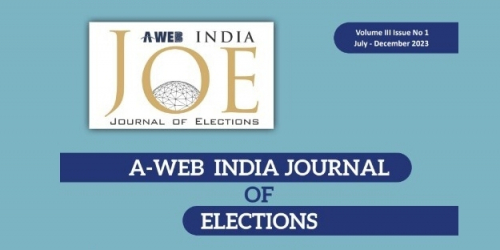
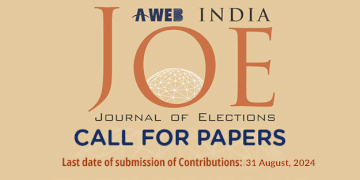
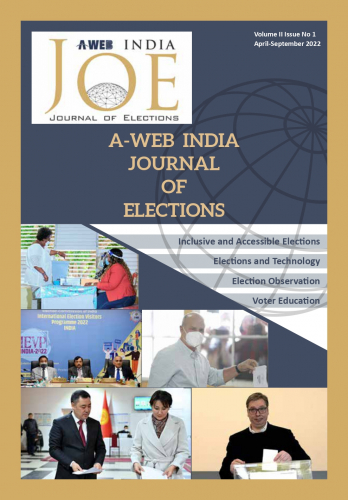
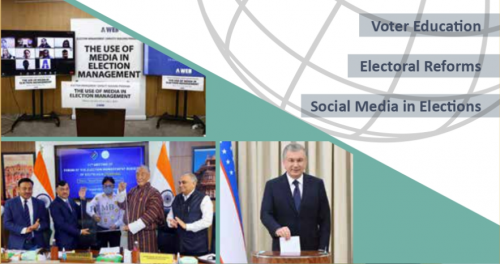
_1-1_page-0001.thumb.jpg.b206f7a5c9201bf2f7ea83fc7ba88128.jpg)
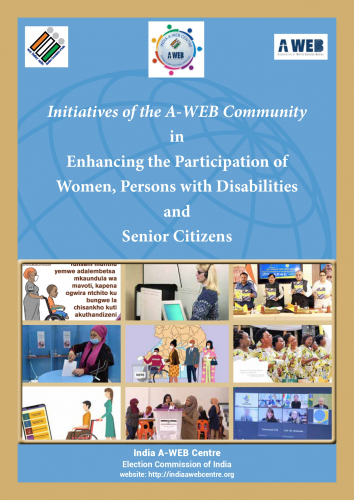
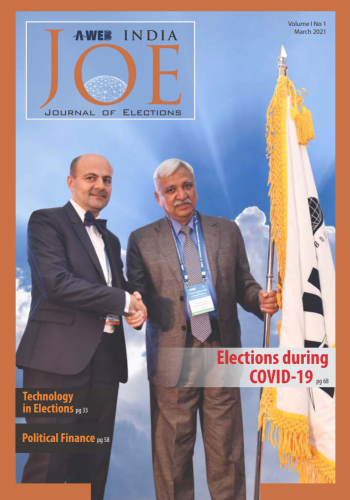
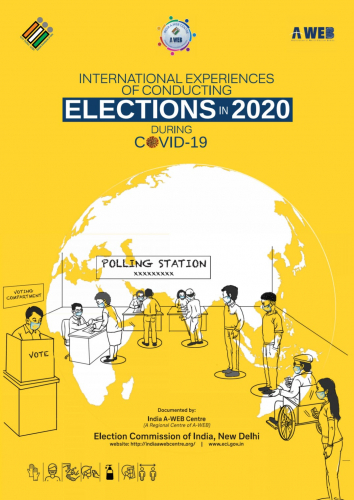
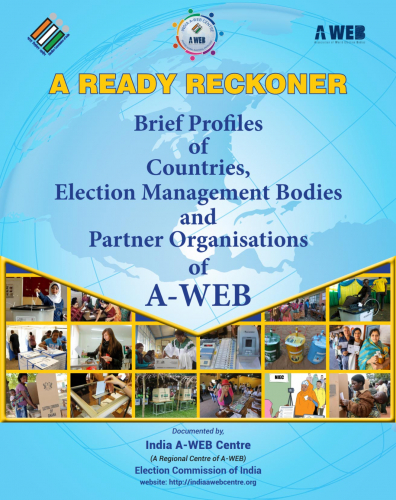
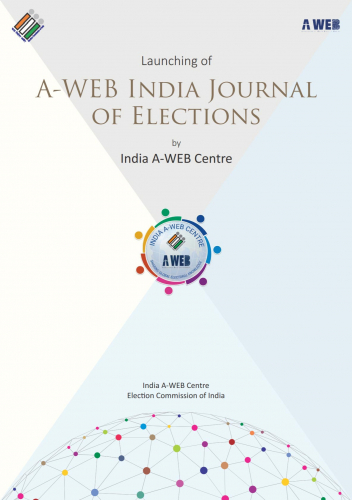
.thumb.jpg.4f668db7ec8e07719d9286b7d15db5ae.jpg)
